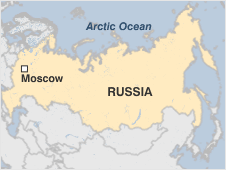 |
Russia emerged from a decade of post-Soviet economic and political turmoil to reassert itself as a world power.
Income from vast natural resources above all oil and gas have helped Russia overcome the economic collapse of 1998. The state-run gas monopoly Gazprom is the world's largest producer and exporter and supplies a growing share of Europe's needs.
Economic strength has allowed Vladimir Putin to enhance state control over political institutions and the media buoyed by extensive public support for his policies as prime minister president and now prime minister again.
Spanning 11 time zones Russia is the largest country on earth in terms of
surface area although large tracts in the north and east are inhospitable and sparsely populated.
Overview
This vast Eurasian land mass covers more than 17m sq km with a climate ranging from the Arctic north to the generally temperate south.
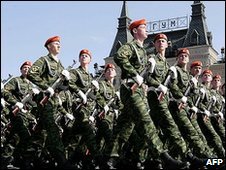
The annual Victory Day parade marks the end of World War II
|
In the period of rapid privatisation in the early 1990s the government of President Boris Yeltsin created a small but powerful group of magnates often referred to as "oligarchs" who acquired vast interests in the energy and media sectors.
President Yeltsin's successor Vladimir Putin moved to reduce the political influence of oligarchs soon after taking office forcing some into exile and prosecuting others. Mikhail Khodorkovsky the former head of the Yukos oil company and a supporter of the liberal opposition is serving eight years in a Siberian penal colony on tax and fraud charges. Yukos assets were later acquired by the state oil giant Rosneft.
Russia resurgent
During Mr Putin's presidency Russia's booming economy and assertive foreign policy bolstered national pride. In particular Russia promoted its perceived interests in former Soviet states more openly even at the cost of antagonising the West.
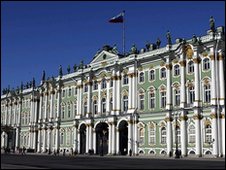
St Petersburg's State Hermitage houses a vast art collection
|
The tensest moment came in August 2008 when a protracted row over two breakaway regions of Georgia escalated into a military conflict between Russia and Georgia. Russia sent troops into Georgia and declared that it was recognising the independence of Abkhazia and South Ossetia sparking angry reactions in the West and fears of a new Cold War.
At the same time Moscow threatened to counter plans by the US Bush administration to develop an anti-missile system in Eastern Europe with its own missiles in Kaliningrad Region on Poland's borders. President Obama later withdrew the plan in a move seen in Russian official circles as a vindication of the assertive foreign policy.
Another source of irritation between Russia and the US is Moscow's role in Iran's nuclear energy programme. Russia agreed in 2005 to supply fuel for Iran's Bushehr nuclear reactor and has been reluctant to support the imposition of UN sanctions on Iran.
Russia's economic power lies in its key natural resources - oil and gas. The energy giant Gazprom is controversially close to the Russian state and critics say it is little more than an economic and political tool of the Kremlin.
At a time of increased concern over energy security Moscow has more than once reminded the rest of the world of the power it wields as a major energy supplier. In 2006 it cut gas to Ukraine after a row between the countries a move that also affected the supply of gas to Western Europe
Ethnic and religious divisions
While Russians make up more than 80% of the population and Orthodox Christianity is the main religion there are many other ethnic and religious groups. Muslims are concentrated among the Volga Tatars and the Bashkirs and in the North Caucasus.
Separatists and latterly armed Islamists have made the Caucasus region of Chechnya a war zone for much of the post-Soviet era. Many thousands have died since Russian troops were first sent to put down a separatist rebellion in 1994.
Moscow is convinced that any loosening of its grip on Chechnya would result in the whole of the North Caucasus falling to anarchy or Islamic militancy.
Human rights groups at home and abroad have accused Russian forces in Chechnya of widespread abuses against the public. Since the 11 September attacks on the US Moscow has tried to present its campaign as part of the global war against terrorism.
In a sign of growing confidence that peace is returning the Russian authorities called a formal end to the military operation against the rebels in 2009. Sporadic violence continues however.
Facts
- Full name: Russian Federation
- Population: 140.9 million (UN 2009)
- Capital: Moscow
- Area: 17 million sq km (6.6 million sq miles)
- Major language: Russian
- Major religions: Christianity Islam
- Life expectancy: 60 years (men) 73 years (women) (UN)
- Monetary unit: 1 rouble = 100 kopecks
- Main exports: Oil and oil products natural gas wood and wood products metals chemicals weapons and military equipment
- GNI per capita: US $9620 (World Bank 2008)
- Internet domain: .ru
- International dialling code: +7
Leaders
President: Dmitry Medvedev
Dmitry Medvedev was sworn in as president in May 2008 taking office as Russia's third president since the collapse of the Soviet Union.
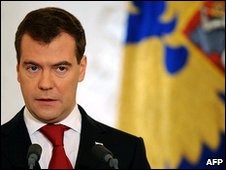
President Dmitry Medvedev
|
The chosen successor of former president Vladimir Putin Mr Medvedev won just over 70% of the vote in presidential elections held in March.
He conducted a fairly low-key campaign but received generous media coverage and was always the clear favourite to win.
As his victory became clear he said that he hoped to work with Mr Putin as his prime minister to improve the quality of life for Russians.
He also said there would be little change in Russia's foreign policy. In August 2008 he showed that he was determined to maintain the assertive stance set by his mentor when in the wake of the conflict between Russia and Georgia he declared that Russia did not want a new Cold War but was not afraid of one either.
However a more liberal side has also been evident. In April 2009 he said in an interview with one of the last media outlets critical of the Kremlin the Novaya Gazeta daily that democracy should not be compromised for the sake of prosperity.
Dmitriy Medvedev was born in 1965 and has been associated with Vladimir Putin since the early 1990s when they were both involved in politics in St Petersburg.
Mr Medvedev is a lawyer by training and managed Mr Putin's presidential election campaign in 2000.
He subsequently worked as chairman of Gazprom and as first deputy prime minister in charge of social programmes.
Prime Minister: Vladimir Putin
Former president Vladimir Putin was confirmed as prime minister on 8 May 2008 one day after his protege Dmitry Medvedev was sworn in as president.
Mr Putin's unprecedented move from the Kremlin to the premiership completed a carefully staged transition which will ensure he remains at the heart of power.
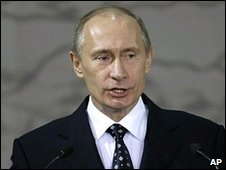
Prime Minister Vladimir Putin
|
As prime minister he has promised to curb inflation cut taxes and boost social spending. Mr Medvedev has said his political mentor will play a "key role" in shaping the country's development over the next decade.
Mr Putin was barred by the constitution from running for a third presidential term in the elections of March 2008.
He was elected to a second term by a landslide in March 2004 with around 70% of the vote. His nearest rival the Communist candidate mustered 14%.
Vladimir Putin who was born in St Petersburg in 1952 started his career in the KGB. From 1990 he worked in the St Petersburg administration before moving to Moscow in 1996. By August 1999 he was prime minister.
He was named acting president by his predecessor Boris Yeltsin who introduced him as the man who could "unite around himself those who will revive Great Russia".
He went on to win presidential elections in May 2000 having gained widespread popularity for his pledge to take a tough line against Chechen rebels.
Media
Russian TV broadcasting is dominated by channels that are either run directly by the state or owned by companies with close links to the Kremlin. The government controls Channel One and Russia TV - two of the three main federal channels - while state-controlled energy giant Gazprom owns NTV. Critics say independent reporting has suffered as a result.
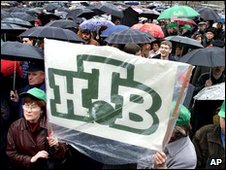
The Kremlin gained control of mould-breaking NTV in 2001
|
For most Russians television especially via the national networks is the main source of domestic and international news.
The broadcasting market is very competitive; state-owned or influenced TV networks attract the biggest audiences. Hundreds of radio stations crowd the dial; state-run networks compete with music-based commercial FM stations.
An English-language satellite channel Russia Today was launched in late 2005. The news-based station is funded by the Kremlin and aims to present "global news from a Russian perspective".
There are more than 400 daily newspapers catering for every taste and persuasion. The major nationals are based in Moscow but many readers in the regions prefer to take local papers. Several influential dailies have been bought by companies with close links to the Kremlin.
The conflict in Chechnya has been blamed for government attacks on press freedom. Journalists have been killed in Chechnya while others have disappeared or have been abducted.
In Moscow and elsewhere journalists have been harassed or physically abused. Reporters investigating the affairs of the political and corporate elite are said to be particularly at risk.
Media rights organisation Reporters Without Borders has expressed concern at "the absence of pluralism in news and information an intensifying crackdown against journalists... and the drastic state of press freedom in Chechnya".
Around 38 million Russians use the internet (Internetworldstats December 2008).
The press
- Komsomolskaya Pravda - mass circulation left-leaning daily controlled by energy group YeSN
- Kommersant - daily business-orientated controlled by steel tycoon Alisher Usmanov
- Moskovsky Komsomolets - popular privately-owned Moscow daily
- Izvestia - popular daily owned by state-run gas monopoly Gazprom
- Rossiyskaya Gazeta - government-owned daily
- Nezavisimaya Gazeta - influential privately-owned daily
- Trud - left-leaning daily owned by Promsvyazbank
- Argumenty i Fakty - popular weekly owned by Promsvyazbank
- Novaya Gazeta - twice-weekly known for its investigative journalism
- The Moscow Times - English-language daily
- The Moscow News - English-language weekly
Television
- Russia TV Channel - national network run by state-owned Russian State Television and Radio Broadcasting Company (VGTRK)
- Channel One - national network 51% owned by state 49% by private shareholders
- NTV - national network owned by state-run Gazprom
- Centre TV - owned by Moscow city government
- Ren TV - Moscow-based commercial station with strong regional network
- Russia Today - state-funded international English-language news channel via satellite
Radio
- Radio Russia - national network run by state-owned Russian State Television and Radio Broadcasting Company (VGTRK)
- Ekho Moskvy - editorially-independent station majority owned by state-run Gazprom
- Radio Mayak - state-run national network
- Russkoye Radio - major private network music-based
- Voice of Russia - state-run external service broadcasts in English and other languages
News agencies
- Itar-Tass - state-owned pages in English
- RIA-Novosti - state-owned pages in English
-
Interfax - private pages in English
AFRICA | ASIA-PACIFIC | AMERICAS | EUROPE | MIDDLEEAST | SOUTHASIA
Mauritania Mauritius Morocco Mozambique Namibia Niger Nigeria Republic-of-congo Rwanda Sao-tome-and-principe Senegal Seychelles Sierra-leone Somalia South-africa Sudan Swaziland Tanzania The-gambia Togo Tunisia Uganda zambia Zimbabwe Australia Brunei Burma Cambodia China East-timor Fiji Indonesia Japan Kazakhstan Kiribati Kyrgyzstan Laos Malaysia Marshall-islands Micronesia Mongolia Nauru New-zealand North-korea Palau Papua-new-guinea Samoa Singapore Solomon-islands South-korea Taiwan Tajikistan Thailand The-philippines Tonga Turkmenistan Tuvalu Uzbekistan Vanuatu Vietnam Antigua-and-barbuda Argentina Bahamas Barbados Belize Bolivia Brazil Canada Chile Colombia Costa-rica Cuba Dominica Dominican-republic Ecuador El-salvador Grenada Guatemala GuyanaHaiti Honduras Jamaica Mexico Nicaragua Panama Paraguay Peru St-kitts-and-nevis St-lucia St-vincent-and-the-grenadines Suriname Trinidad-and-tobago United-states-of-america Uruguay Venezuela Albania Andorra Armenia Austria Azerbaijan Belarus Belgium Bosnia-hercegovina Bulgaria Croatia Cyprus Czech-republic Denmark Estonia Finland France Georgia Germany Greece Hungary Iceland Ireland Italy Latvia Liechtenstein Lithuania Luxembourg Macedonia Malta Moldova Monaco Montenegro Norway Poland Portugal Russia San-marino Serbia Slovakia Slovenia Spain Sweden Switzerland The-netherlands Turkey Ukraine United-kingdom Vatican Algeria Egypt Iran Iraq Israel-and-palestinian-territories Jordan Kuwait Lebanon Libya Mauritania Oman Saudi-arabia Sudan Syria Tunisia United-arab-emirates Yemen Afghanistan Bangladesh Bhutan India Nepal Pakistan Sri-Lanka The-Maldives

